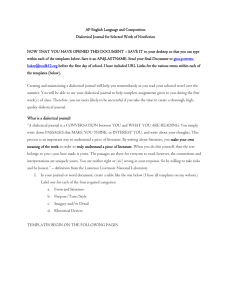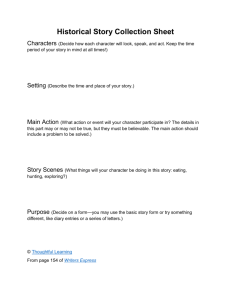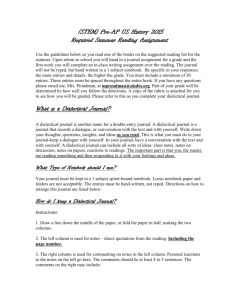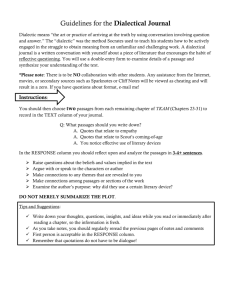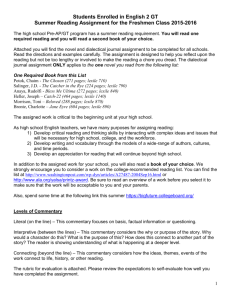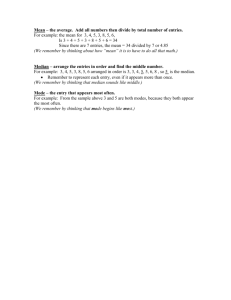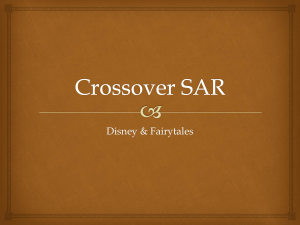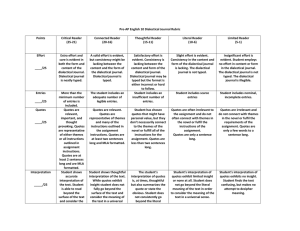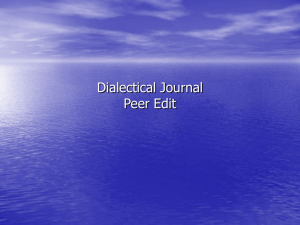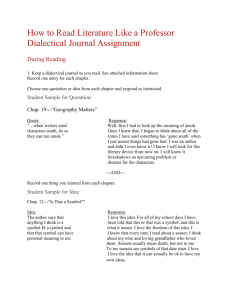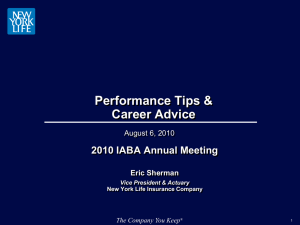2015-2016 Summer Reading List and Assignment
advertisement
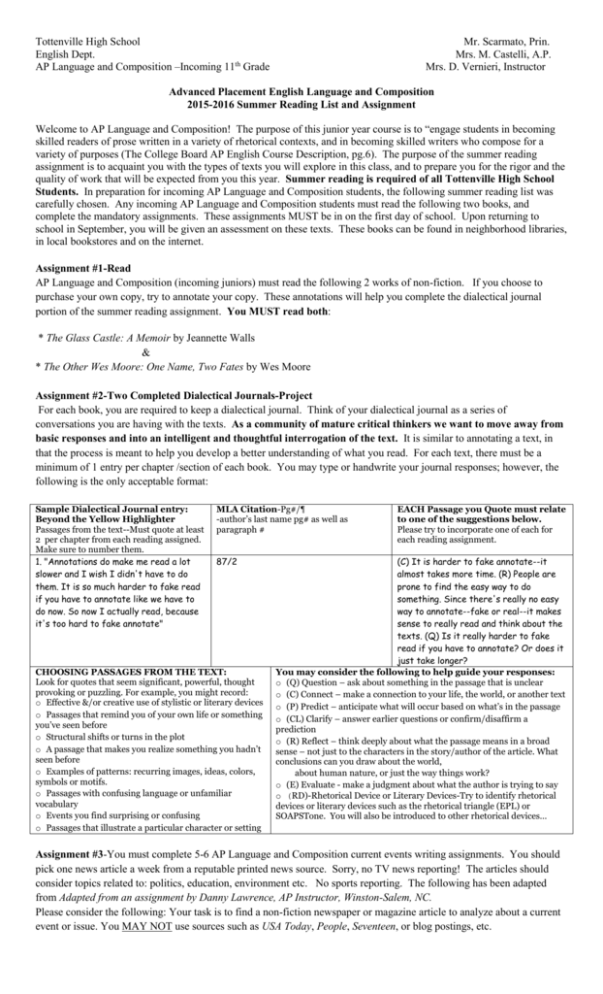
Tottenville High School English Dept. AP Language and Composition –Incoming 11th Grade Mr. Scarmato, Prin. Mrs. M. Castelli, A.P. Mrs. D. Vernieri, Instructor Advanced Placement English Language and Composition 2015-2016 Summer Reading List and Assignment Welcome to AP Language and Composition! The purpose of this junior year course is to “engage students in becoming skilled readers of prose written in a variety of rhetorical contexts, and in becoming skilled writers who compose for a variety of purposes (The College Board AP English Course Description, pg.6). The purpose of the summer reading assignment is to acquaint you with the types of texts you will explore in this class, and to prepare you for the rigor and the quality of work that will be expected from you this year. Summer reading is required of all Tottenville High School Students. In preparation for incoming AP Language and Composition students, the following summer reading list was carefully chosen. Any incoming AP Language and Composition students must read the following two books, and complete the mandatory assignments. These assignments MUST be in on the first day of school. Upon returning to school in September, you will be given an assessment on these texts. These books can be found in neighborhood libraries, in local bookstores and on the internet. Assignment #1-Read AP Language and Composition (incoming juniors) must read the following 2 works of non-fiction. If you choose to purchase your own copy, try to annotate your copy. These annotations will help you complete the dialectical journal portion of the summer reading assignment. You MUST read both: * The Glass Castle: A Memoir by Jeannette Walls & * The Other Wes Moore: One Name, Two Fates by Wes Moore Assignment #2-Two Completed Dialectical Journals-Project For each book, you are required to keep a dialectical journal. Think of your dialectical journal as a series of conversations you are having with the texts. As a community of mature critical thinkers we want to move away from basic responses and into an intelligent and thoughtful interrogation of the text. It is similar to annotating a text, in that the process is meant to help you develop a better understanding of what you read. For each text, there must be a minimum of 1 entry per chapter /section of each book. You may type or handwrite your journal responses; however, the following is the only acceptable format: Sample Dialectical Journal entry: Beyond the Yellow Highlighter Passages from the text--Must quote at least 2 per chapter from each reading assigned. Make sure to number them. 1. "Annotations do make me read a lot slower and I wish I didn't have to do them. It is so much harder to fake read if you have to annotate like we have to do now. So now I actually read, because it's too hard to fake annotate" MLA Citation-Pg#/¶ -author’s last name pg# as well as paragraph # 87/2 CHOOSING PASSAGES FROM THE TEXT: Look for quotes that seem significant, powerful, thought provoking or puzzling. For example, you might record: o Effective &/or creative use of stylistic or literary devices o Passages that remind you of your own life or something you’ve seen before o Structural shifts or turns in the plot o A passage that makes you realize something you hadn’t seen before o Examples of patterns: recurring images, ideas, colors, symbols or motifs. o Passages with confusing language or unfamiliar vocabulary o Events you find surprising or confusing o Passages that illustrate a particular character or setting EACH Passage you Quote must relate to one of the suggestions below. Please try to incorporate one of each for each reading assignment. (C) It is harder to fake annotate--it almost takes more time. (R) People are prone to find the easy way to do something. Since there's really no easy way to annotate--fake or real--it makes sense to really read and think about the texts. (Q) Is it really harder to fake read if you have to annotate? Or does it just take longer? You may consider the following to help guide your responses: o (Q) Question – ask about something in the passage that is unclear o (C) Connect – make a connection to your life, the world, or another text o (P) Predict – anticipate what will occur based on what’s in the passage o (CL) Clarify – answer earlier questions or confirm/disaffirm a prediction o (R) Reflect – think deeply about what the passage means in a broad sense – not just to the characters in the story/author of the article. What conclusions can you draw about the world, about human nature, or just the way things work? o (E) Evaluate - make a judgment about what the author is trying to say o (RD)-Rhetorical Device or Literary Devices-Try to identify rhetorical devices or literary devices such as the rhetorical triangle (EPL) or SOAPSTone. You will also be introduced to other rhetorical devices… Assignment #3-You must complete 5-6 AP Language and Composition current events writing assignments. You should pick one news article a week from a reputable printed news source. Sorry, no TV news reporting! The articles should consider topics related to: politics, education, environment etc. No sports reporting. The following has been adapted from Adapted from an assignment by Danny Lawrence, AP Instructor, Winston-Salem, NC. Please consider the following: Your task is to find a non-fiction newspaper or magazine article to analyze about a current event or issue. You MAY NOT use sources such as USA Today, People, Seventeen, or blog postings, etc. Articles, editorials, or essays from the following issues-based magazines ARE acceptable: Newsweek, Time, The New Yorker, Rolling Stone, Atlantic Monthly, New Republic, Forbes, The Economist, The Atlantic, National Geographic, Harper’s, and Scientific American Articles, editorials, or essays from the following reputable newspapers1 ARE acceptable: Staten Island Advance, The New York Times, The National Post, The Guardian, The Washington Post, The State, The Herald-Journal, The Post and Courier, The Atlanta Journal-Constitution, The Miami Herald, The Los Angeles Times, The San Francisco Chronicle, The Dallas Morning News, The Huffington Post, and The Wall Street Journal * Each article should be no older than a month or two, to be considered “current events.” For each article please complete the following: Include a copy of the article with your two paragraph response. 1. Read the article. 2. First, on a separate piece of paper, (written or typed) identify what you think the author’s thesis statement is. 3. Then write a summary of the article you have read. You must include a small quote from the article in your summary (be sure to “set up” the source). A “small” quote can be words or parts of a sentence. Avoid quoting complete sentences. DO NOT SPEND MORE THAN HALF THE PAGE ON THE SUMMARY!!! 4. Lastly, you will write commentary. Comment on the content of the article (what the author has to say). When you comment on the content, you may be defending, challenging, or qualifying the author’s claim/point/thesis/interpretation; Some questions you might want to think about/comment on: 1. What are some of the author’s best arguments? What makes them good? 2. Which arguments or points made by the author do not make sense to you and why? 3. How is the author using appeals to get you to agree with him or her? RUBRICS Dialectical Journal Rubric Critical Reader (detailed, elaborate responses)—90-100: Extra effort is evident. You include more than the minimal number of entries. Your quotes are relevant, important, thought provoking, and representative of the themes of the text. You can “read between the lines” of the text (inference). You consider meaning of the text in a universal sense. You create new meaning through connections with your own experiences or other texts. You carry on a dialogue with the writer. You question, agree, disagree, appreciate, and object. Sentences are grammatically correct with correct spelling and punctuation. Connected Reader (detailed responses)—80-89: A solid effort is evident. You include an adequate number of legible entries. Your quotes are relevant and connect to the themes of the novel. Entries exhibit insight and thoughtful analysis. You construct a thoughtful interpretation of the text. You show some ability to make meaning of what you read. You create some new meaning through connections with your own experiences and the text. You explain the general significance. You raise interesting questions. You explain why you agree or disagree with the text. Thoughtful Reader (somewhat detailed responses)—75-79: You include an insufficient number of entries. Sentences are mostly correct with a few careless spelling and grammatical errors. You selected quotes that may be interesting to you, but that don’t necessarily connect to the themes of the novel. Entries exhibit insight and thoughtful analysis at times. You make connections, but explain with little detail. You rarely make new meaning from the reading. You ask simple questions of the text. You may agree or disagree, but don’t support your views. Literal Reader (simple, factual responses)—70-74: You include few entries. Entries exhibit limited insight or none at all. You accept the text literally. You are reluctant to create meaning from the text. You make few connections which lack detail. You are sometimes confused by unclear or difficult sections of the text. Limited Reader (perfunctory responses)—below 70: You include very few entries. Very little effort is evident. You find the text confusing, but make no attempt to figure it out. You create little or no meaning from the text. You make an occasional connection to the text, and the ideas lack development. Sentences contain numerous grammatical and spelling errors. Current Events Rubrics: Articles Summary Commentary Conventions 1 1 Articles chosen were not academic or rigorous in nature or from unacceptable sources Vague summary with little use of examples or quotes. Commentary which reveals little insight or originality. Poor control of conventions. Many errors. 2 Some articles chosen were not academic or rigorous in nature or from unacceptable sources Clear summary with some use of examples and quotes. Interesting, commentary which reveals some insight. Limited control of conventions. Some errors. 3 Most of the articles were carefully selected and were academic in nature or chosen from acceptable sources Clear, concise, detailed summary with use of examples and quotes. Interesting commentary which reveals insight and originality. Good control of conventions. Few errors. 4 Most of the articles were carefully selected and were academic in nature or chosen from acceptable sources Clear, concise, detailed summary with eloquent use of examples and quotes. Rich, interesting, exemplary commentary which reveals insight and originality. Excellent control of conventions. No errors. Many of these sources can be accessed online for free. Bookstores and the public library are other places to check for access to print and/or electronic versions.
